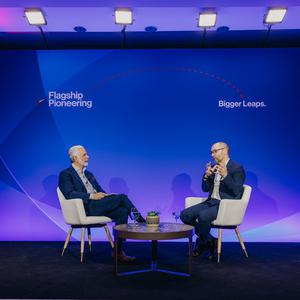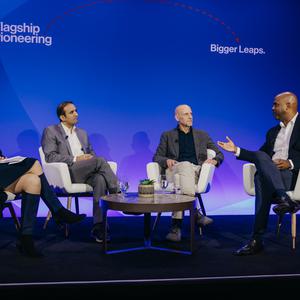George Church, a professor at Harvard and MIT, has contributed to the development of next-generation genome sequencing, synthetic biology, and genome engineering, co-inventing technologies now in daily use in labs all over the world. He is also a longtime friend of Flagship Pioneering. Since the creation of the firm in 2000, he has been part of the founding teams of a large number of Flagship companies, including LS9, Joule, Seres, Codon, Axcella, Editas, Inari, EngeneOS, and BG Medicine. Jason Pontin sat down with Church to discuss the origins of all life on earth, as well as the frustrations and promise of genome sequencing.
JP: Why did information-rich polymers emerge from the primordial soup in the first place?
GC: Why is a tricky question. It’s likely that if you put a bunch of monomers together, they will produce polymers spontaneously. Not for any particular reason. But once they start existing, some would exist at higher ratios and would persist, and then you’ve got the beginnings of Darwinian evolution.
Do you have a sense of how rare the event is? It happened once on earth. Is life common in the universe, or are we all alone—or something in between?
Unfortunately, it may require us to find at least one independent event. And if we find something, say on Mars, and it looks very much like ours, it’s probably not independent because Mars and Earth exchanged rocks.
We’ve spent quite a bit of effort on this. That said, a hundred years from now, the effort we put into searching for extraterrestrial intelligence or searching Mars for independent polymers will look pathetic.
Is there an evolutionary question as fundamental as life’s origins that you would like to see answered or that you’d like to answer yourself?
I think almost every phase in evolution is fascinating and maybe even fundamental. Certainly, the emergence of morphology and the body is incredibly important. I think the origin of translation machinery—the ribosome—is maybe more fundamental than the origin of life at the monomer and polymer level. Ribosomes are incredibly complicated and do amazing things. So the three phases would be: origin of polymers; translation; and the body. And intelligence—it would be nice to observe where that came from. One of the capabilities I’d like to develop as a technology is the ability to do 3-D printing in developmental biology.







